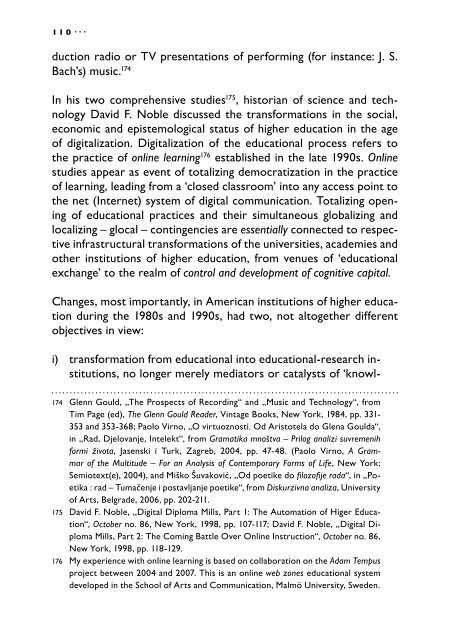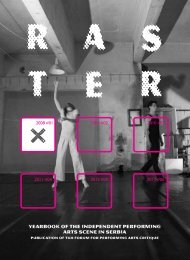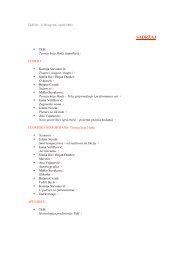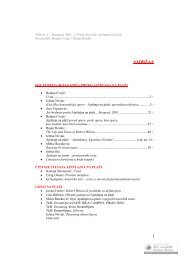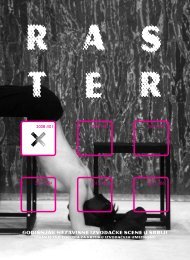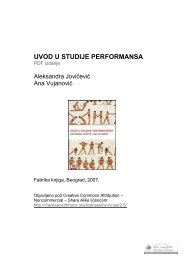Miško Šuvaković Epistemology of Art - TkH
Miško Šuvaković Epistemology of Art - TkH
Miško Šuvaković Epistemology of Art - TkH
You also want an ePaper? Increase the reach of your titles
YUMPU automatically turns print PDFs into web optimized ePapers that Google loves.
110··· ··· 111<br />
duction radio or TV presentations <strong>of</strong> performing (for instance: J. S.<br />
Bach’s) music. 174<br />
In his two comprehensive studies 175 , historian <strong>of</strong> science and technology<br />
David F. Noble discussed the transformations in the social,<br />
economic and epistemological status <strong>of</strong> higher education in the age<br />
<strong>of</strong> digitalization. Digitalization <strong>of</strong> the educational process refers to<br />
the practice <strong>of</strong> online learning 176 established in the late 1990s. Online<br />
studies appear as event <strong>of</strong> totalizing democratization in the practice<br />
<strong>of</strong> learning, leading from a ‘closed classroom’ into any access point to<br />
the net (Internet) system <strong>of</strong> digital communication. Totalizing opening<br />
<strong>of</strong> educational practices and their simultaneous globalizing and<br />
localizing – glocal – contingencies are essentially connected to respective<br />
infrastructural transformations <strong>of</strong> the universities, academies and<br />
other institutions <strong>of</strong> higher education, from venues <strong>of</strong> ‘educational<br />
exchange’ to the realm <strong>of</strong> control and development <strong>of</strong> cognitive capital.<br />
Changes, most importantly, in American institutions <strong>of</strong> higher education<br />
during the 1980s and 1990s, had two, not altogether different<br />
objectives in view:<br />
i) transformation from educational into educational-research institutions,<br />
no longer merely mediators or catalysts <strong>of</strong> ‘knowl-<br />
174 Glenn Gould, „The Prospects <strong>of</strong> Recording“ and „Music and Technology“, from<br />
Tim Page (ed), The Glenn Gould Reader, Vintage Books, New York, 1984, pp. 331-<br />
353 and 353-368; Paolo Virno, „O virtuoznosti. Od Aristotela do Glena Goulda“,<br />
in „Rad, Djelovanje, Intelekt“, from Gramatika mnoštva – Prilog analizi suvremenih<br />
formi života, Jasenski i Turk, Zagreb, 2004, pp. 47-48. (Paolo Virno, A Grammar<br />
<strong>of</strong> the Multitude – For an Analysis <strong>of</strong> Contemporary Forms <strong>of</strong> Life, New York:<br />
Semiotext(e), 2004), and <strong>Miško</strong> <strong>Šuvaković</strong>, „Od poetike do filoz<strong>of</strong>ije rada“, in „Poetika<br />
: rad – Tumačenje i postavljanje poetike“, from Diskurzivna analiza, University<br />
<strong>of</strong> <strong>Art</strong>s, Belgrade, 2006, pp. 202-211.<br />
175 David F. Noble, „Digital Diploma Mills, Part 1: The Automation <strong>of</strong> Higer Education“,<br />
October no. 86, New York, 1998, pp. 107-117; David F. Noble, „Digital Diploma<br />
Mills, Part 2: The Coming Battle Over Online Instruction“, October no. 86,<br />
New York, 1998, pp. 118-129.<br />
176 My experience with online learning is based on collaboration on the Adam Tempus<br />
project between 2004 and 2007. This is an online web zones educational system<br />
developed in the School <strong>of</strong> <strong>Art</strong>s and Communication, Malmö University, Sweden.<br />
edge’, but production terminals <strong>of</strong>fering ownership over one’s<br />
project results and their proper sale on the knowledge market<br />
(spanning from highly-developed industries, through media<br />
systems, to industry <strong>of</strong> culture and entertainment); and<br />
ii) transformation <strong>of</strong> educational institutions into possessors <strong>of</strong><br />
‘right <strong>of</strong> access’ to knowledge (namely, bureaucratically structured<br />
and rendered knowledge), whereas the university is restructured<br />
from a relatively autonomous social institution <strong>of</strong><br />
development and communication <strong>of</strong> human knowledge, into<br />
a commercial enterprise which sells access to ‘packages’ <strong>of</strong><br />
knowledge and conditions wherein intellectual work is transposed<br />
into cognitively deemed and marketed commodity. 177<br />
Both transformations <strong>of</strong> higher education are sustained by infrastructures<br />
catering for participation in pr<strong>of</strong>it-making ventures. This refers<br />
to commercial corporations which support development, distribution<br />
and networks <strong>of</strong> ‘online education’. For instance, one <strong>of</strong> such<br />
companies affiliated with the Californian UCLA is ‘Onlinelearning.<br />
net’, also known as ‘Home Education Network – HEN’. The new<br />
structural relationship between universities and affiliated commercial<br />
companies allows for controlled and advanced transformation <strong>of</strong><br />
traditional humanist education based on ‘intellectual activities <strong>of</strong> free<br />
academic exchange’, or (in the case <strong>of</strong> art schools) education based on<br />
‘creative activities and free development <strong>of</strong> creative potentials’ – into<br />
intellectual or educational capital. Intellectual educational capital is<br />
associated with target value and right <strong>of</strong> disposal <strong>of</strong> intellectual and<br />
cognitive property. This shift was brought about when the system <strong>of</strong><br />
curricula as sum total <strong>of</strong> study programs, and study programs as sum<br />
total <strong>of</strong> courses-syllabi, was transformed into a system <strong>of</strong> ‘products’<br />
with commercial value attached – products to be sold or purchased,<br />
in market terms. University, accordingly, becomes a commercial enterprise<br />
which sells license, patents, or exclusive projects: namely,<br />
production house marketing video footage, digitalized courses, CD-<br />
ROMs and Web pages by means <strong>of</strong> control <strong>of</strong> the right <strong>of</strong> access<br />
and copyright. Academic course, from an active and straightforward<br />
177 David F. Noble, „Digital Diploma Mills, Part 1: The Automation <strong>of</strong> Higer Education“,<br />
p. 109.


